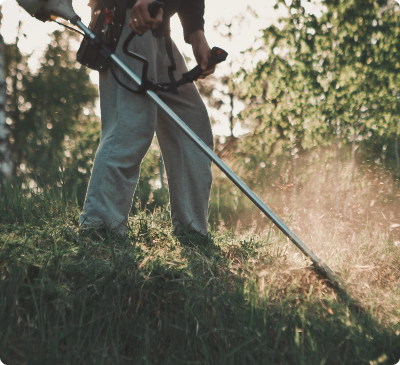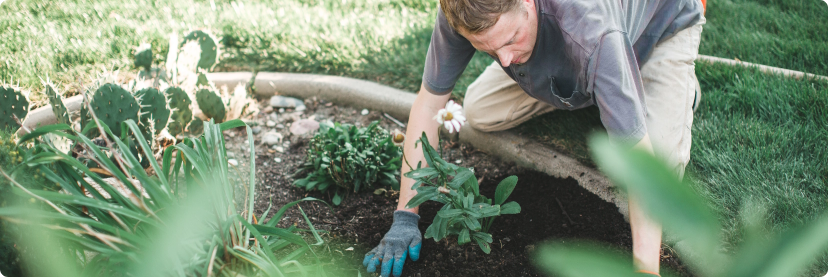21 Oct 2025
7 MIN
READ
Being a landlord isn’t just about collecting rent - it’s about building good relationships and caring for your property, including the garden.
Having open and honest conversations with your tenants about who’s responsible for garden maintenance helps everything run smoothly and prevents misunderstandings or legal issues.
Who’s responsible for garden maintenance responsibilities?
Landlord responsibilities
- Ensuring the garden is in good condition at the start of the tenancy
- Keeping the garden safe and structurally sound
- Carrying out major repairs
- Taking action if a tenant reports an issue outside their responsibility
Tenant responsibilities
- Regularly cutting grass to keep the garden tidy
- Keeping pathways and outdoor areas clear of clutter
- Reporting any major issues or damage promptly
- Watering any plants, if applicable
It’s important to clearly set responsibilities in your tenancy agreement to prevent disputes and make sure both parties know what’s expected.
Please note, these responsibilities may vary depending on your tenancy agreement, the property, and local laws. If in doubt, it’s best to check the specific terms of your tenancy agreement.
When does a landlord step in?
In a nutshell, landlords are responsible for keeping the property in good condition and making necessary repairs. Tenants are responsible for maintaining the property in its current condition. The same rules typically apply to garden maintenance.
However, there are times when the landlord may need to step in, such as:
Structural issues
Major repairs
Weather damage
Health and safety hazards
Legal obligations
Breach of tenancy agreement
The legal side
The Landlord & Tenant Act 1985 sets basic rules about areas landlords must maintain. It states that landlords are responsible for keeping the property, including the garden, safe and in good repair. For example, issues like broken fences, overgrown trees, or damaged paths are the landlord’s responsibility.
Creating clear tenancy clauses
Having a well-drafted tenancy agreement provide clear guidance that can help keep discussions focused and prevent misunderstandings. When in doubt, a quick look at the agreement can help clear things up and keep things friendly.

What is a garden maintenance clause?
All tenancy agreements should include a garden maintenance clause that:
- Specifies the landlord’s responsibilities
- Outlines tenant responsibilities
- Sets reasonable expectations for ongoing upkeep
- Provides procedures for reporting issues
- Clarifies any restrictions or usage limitations
Use of the garden
If there are activities you want to discourage - like hosting large parties or using certain equipment - it’s important to mention these upfront. Being transparent helps keep things friendly and ensures everyone understands their responsibilities.

Legal review
The terms of your tenancy agreement need to be compliant and reasonably enforceable. Getting a legal professional to review can give you peace of mind that everything is clear and fair.
Tenancy agreements are designed to help keep landlords and tenants happy. AXA’s guide offers more information creating effective tenancy agreements.
Resolving garden disputes
More disagreements than you think can be sorted out with some open conversation, as being understanding and approachable can go a long way. And often, both parties are eager to sort things out without escalation.
If an issue can’t be resolved amicably, seeking help from a mediator or third party can be a useful option.
Good communication practices
Maintaining good, open communication is essential as a landlord. It helps build strong relationships and encourages tenants to flag issues or come to you with concerns.
Clear communication helps keep your garden in good shape and ensures everyone knows their role.
When are deposit deductions valid?
Any deductions must be reasonable and based on actual expenses, as a result of the tenant not following the tenancy agreement. It’s helpful to document the gardens condition at the start of the tenancy and keep evidence of any damage.
Be sure to get snappy and take plenty of photos of the garden in its current condition for your own records.
Seasonal maintenance planning
Keep in mind that garden maintenance needs change with the seasons. So, why not mark your calendar as a reminder? That way you won’t forget to be extra diligent around certain times of year.

Keeping paths clear
As a rule of thumb, you should be carrying out safety checks sporadically for any risks. However, in the colder months of the year, it’s a good idea to pop a few more in the diary.
For example, bad weather like snow and ice, or even storms, can cause trees to fall and paths to deteriorate. Both of which cause make accidents more prone to happen.
FAQs
Who is responsible for cutting the grass in a tenancy?
When it comes to grass cutting, the responsibility usually depends on the tenancy agreement. Tenants often handle regular cutting and watering, while landlords may be responsible for larger tasks like pruning or hedges. Your agreement should clearly outline responsibilities for each party.
What are inspection logs?
Inspection logs are used to keep details of routine inspections. Typically, they include information on:
- Date and time of the inspection
- Areas reviewed
- Issues or concerns
- Any repairs needed
Are tenants expected to improve the existing condition of the garden?
Tenants are generally responsible for maintaining the garden’s current condition. They’re not expected to make improvements or changes to the garden beyond regular upkeep.
Protecting your investment
To avoid misunderstandings and disputes, it’s essential to have clear, written agreements and keep detailed records of garden conditions and maintenance.
Additionally, it’s worthwhile exploring insurance coverage, such as landlord insurance to provide protection against unexpected events, including damage or liability claims related to the garden or property. Proper planning and protection can help you safeguard your investment and maintain peace of mind.
Protect the future of your property with AXA
Being a good landlord is about more than collecting the rent. It’s about protecting your investment too. Protect your property today and Future You will thank you.
All links are checked and valid at time of publishing, 21 October 2025.
